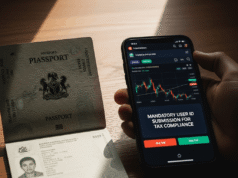+3.26%
+5.96%
+1.84%
+3.82%
+0.49%
-8.47%
Starting January 1, 2026, Nigerian banks and financial institutions will require customers to provide a valid Tax ID to open or maintain accounts, as mandated by the Nigeria Tax Administration Act 2025. This reform represents one of the most significant shifts in Nigeria’s financial system in recent years, but the implementation is more nuanced than initial reports suggested.
Who Actually Needs a Tax ID?
Section 4 of the NTAA requires all taxable persons—those engaged in trade, business, or income-generating activities—to register with the tax authority and obtain a Tax ID. This includes anyone earning from employment, business ventures, freelancing, or professional services.
However, the Joint Tax Board (JTB) has clarified that not every Nigerian needs a Tax ID to operate bank accounts beyond January 1, 2026. The requirement specifically targets taxable persons, not ordinary citizens with passive income sources like dividends, interest, or rent.
Your NIN is Your Tax ID (No Extra Registration Needed)
Here’s the relief: The Tax ID is a unique number, not a physical card, and can be obtained free of charge online or at FIRS, State IRS, or JTB offices. For most individuals and businesses, their NIN or CAC RC number will serve as their Tax ID with no extra paperwork.
For Individuals: Your National Identification Number (NIN) automatically functions as your Tax ID.
For Businesses: Companies, NGOs, and incorporated trustees receive a TIN automatically with CAC registration. For unincorporated businesses, your personal TIN suffices.
For Diaspora: Nigerians abroad can obtain Tax IDs using their NIN for banking or investment purposes through the NIMC website.
How to Register or Verify Your Tax ID
Individuals can now apply for TIN online using their Bank Verification Number (BVN). The process is straightforward:
- Apply Online: Visit the Joint Tax Board (JTB) portal and complete registration using your NIN or BVN
- Verify Existing Tax ID: Check if you already have a Tax ID at the JTB TIN Verification Portal
- No Cost: Registration is completely free through official channels
What Happens Without a Tax ID?
Without a Tax ID, taxable persons may not be able to operate bank accounts, insurance policies, pension accounts, or investment accounts. This applies to both new account openings and existing accounts for individuals classified as taxable persons.
The enforcement creates a comprehensive tracking mechanism to eliminate tax evasion, ensuring income-generating activities are properly documented. Even government entities, foreign companies doing business in Nigeria, and all ministries must comply with the registration requirement.
✅ Action Steps Before January 2026
- 1. Verify if you already have a Tax ID at JTB Verification Portal
- 2. If you’re a taxable person without a Tax ID, register immediately at JTB Registration Portal
- 3. Ensure your NIN is active and linked to your bank accounts
- 4. Keep digital copies of your Tax ID/NIN for quick reference
Bottom Line: If you’re earning income in Nigeria, the January 1, 2026 deadline isn’t negotiable. The smart move is verifying your Tax ID status now rather than facing account restrictions later. The process is free, straightforward, and your NIN likely already serves as your Tax ID—you just need to confirm it.
Need Help With Tax Compliance?
Don’t wait until the deadline. Our team can help you navigate Nigeria’s new tax requirements, verify your Tax ID status, and ensure your business stays compliant.




